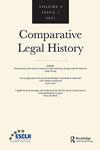To the uttermost parts of the earth: legal imagination and international power, 1300–1870
IF 0.5
Q2 LAW
引用次数: 6
Abstract
Martti Koskenniemi’s sweeping book on European legal thought is the longawaited complement to his seminal study, The Gentle Civilizer of Nations. That book detailed the rise of international law as a profession in the last quarter of the nineteenth century. This book traces multiple strands of European discourse about the law of nations across the preceding half millennium. Koskenniemi analyses the efforts of European legal writers to define property and sovereignty in relation to the projection of power beyond Europe. As reflected in the title, Koskenniemi insists that this book is not about the history of international law but instead a study of ‘legal imagination’. He defines legal imagination as the work of ‘ambitious men, mostly in Europe’ as they deployed ‘the legal vocabularies available to them’ to describe ‘the expansion of authority beyond their domestic world’ (1). Rather than revealing the origins of later legal doctrine, the goal is to illuminate ‘a form of institutional action that takes place in the context of controversy through the authoritative use of language’ (8). Legal imagination, Koskenniemi goes on to assert, was deeply rooted in specific political and institutional environments. Commentary on law always aimed at persuasion, so we must understand the aims and stakes of ongoing political conflicts if we are to grasp the development of legal discourse. Koskenniemi adapts Levi-Strauss’s term ‘bricolage’ to describe the process by which legal writers drew on materials from ‘the domestic legal system’ and built on their ‘domestic legal training’ when characterizing the juridical order beyond Europe (2, 9). The emphasis on specific formative contexts leads Koskenniemi to organize the book mainly around geographically centred traditions of legal writing. The first section contains chapters about the nature of ius gentium in late-medieval France, Spain and Italian city-states, followed by a chapter on Hugo Grotius. The next three sections focus successively on legal thought in France and its Atlantic empire, Britain and the empire, and the German states. The Conclusion and Epilogue follow. Running through the book is the theme of law’s protection of property. In an original and persuasive discussion of scholasticism in Spain, Koskenniemi shows that concerns with property pervaded the writings of Spanish political到地球的最深处:法律想象与国际力量,1300–1870
Martti Koskenniemi关于欧洲法律思想的全面著作是对他开创性研究《国家的温和公民》期待已久的补充。这本书详细介绍了国际法作为一种职业在19世纪最后25年的兴起。这本书追溯了欧洲在前半个千年中关于国家法的多条论述。Koskenniemi分析了欧洲法律作家在界定财产和主权与欧洲以外权力投射的关系方面所做的努力。正如标题所反映的那样,Koskenniemi坚持认为,这本书不是关于国际法的历史,而是对“法律想象”的研究。他将法律想象定义为“雄心勃勃的人,主要在欧洲”的工作,因为他们使用“可用的法律词汇”来描述“权力在国内世界之外的扩张”(1)。与其揭示后来法律学说的起源,不如阐明“通过权威的语言使用,在争议背景下发生的一种制度行动形式”(8)。Koskenniemi继续断言,法律想象力深深植根于特定的政治和制度环境。法律评论总是以说服为目的,因此,如果我们要掌握法律话语的发展,就必须了解正在进行的政治冲突的目的和利害关系。Koskenniemi采用了Levi Strauss的术语“拼凑”来描述法律作家在描述欧洲以外的司法秩序时,借鉴“国内法律体系”的材料,并建立在“国内法律培训”的基础上的过程(2,9)。对特定形成语境的强调导致Koskenniemi主要围绕以地理为中心的法律写作传统来组织这本书。第一节包含了关于中世纪晚期法国、西班牙和意大利城邦的龙胆的性质的章节,然后是关于雨果·格老秀斯的章节。接下来的三个部分依次关注法国及其大西洋帝国、英国及其帝国和德意志国家的法律思想。结语和结语如下。贯穿全书的是法律保护财产的主题。在对西班牙经院哲学的一次新颖而有说服力的讨论中,Koskenniemi表明,对财产的担忧弥漫在西班牙政治学的著作中
本文章由计算机程序翻译,如有差异,请以英文原文为准。
求助全文
约1分钟内获得全文
求助全文
来源期刊
CiteScore
1.70
自引率
0.00%
发文量
20
期刊介绍:
Comparative Legal History is an international and comparative review of law and history. Articles will explore both ''internal'' legal history (doctrinal and disciplinary developments in the law) and ''external'' legal history (legal ideas and institutions in wider contexts). Rooted in the complexity of the various Western legal traditions worldwide, the journal will also investigate other laws and customs from around the globe. Comparisons may be either temporal or geographical and both legal and other law-like normative traditions will be considered. Scholarship on comparative and trans-national historiography, including trans-disciplinary approaches, is particularly welcome.

 求助内容:
求助内容: 应助结果提醒方式:
应助结果提醒方式:


